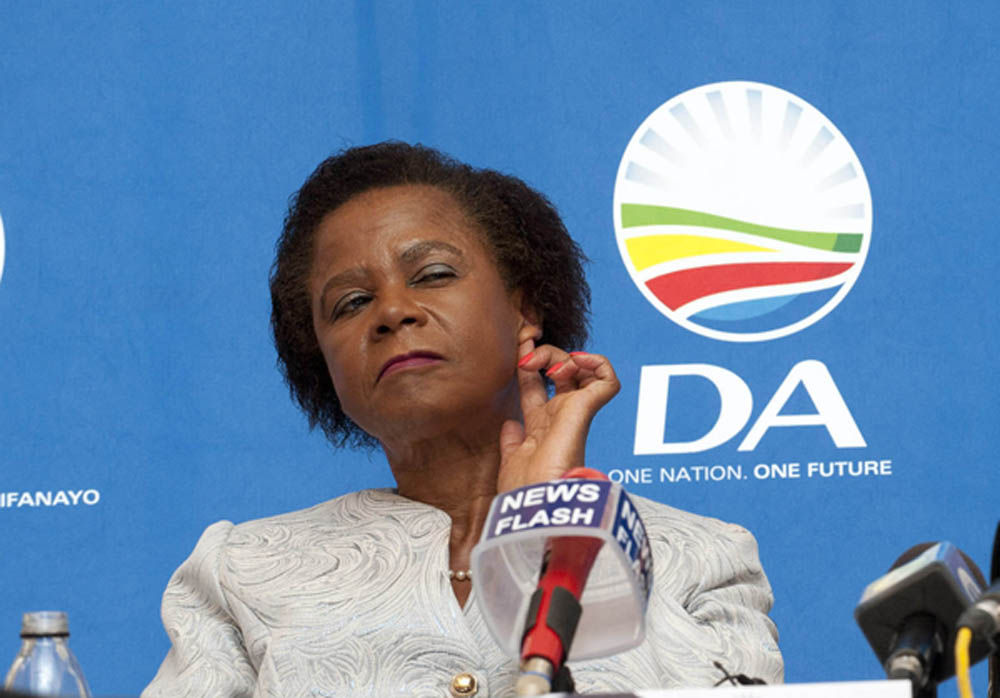Helen Zille can be witty and candid
Democratic Alliance (DA) leader Helen Zille likes her humour sardonic and, more often than not, self-deprecating. Ask her about the dewrinkling Botox injections that, these days, she happily talks about, and she jokes about how badly she needs a treatment ahead of the elections. Talk about race perceptions of the DA, and she mournfully confesses that she is unable to tan and so mitigate her own skin colour.
Sitting across a table from Zille –and, one can easily imagine, in the kind of head-to-head debate with, say, President Jacob Zuma that the DA would so like to have – she appears to have no buttons to press, no issues she considers sacred, nothing that will launch her into unthinking outrage.
Her Twitter alter ego, @helenzille, on the other hand, is touchy, abrasive, argumentative and, as even her advisers in the party admit, often ill-advised. At one point, three of her colleagues ganged up on her to tell her to stop tweeting. She declined.
“I said: ‘Listen guys, I’ve got to be able to be myself and If I can’t succeed as a politician being myself, well, that’s fine – I’ll move on.'”
Twitter, for Zille, represents freedom, not least from the media.
Criticism of her hair, her wardrobe, even her tactics of campaigning, those she will accept; that is politics. But don’t touch her on her Twitter.
According to Zille, and what she paints as extensive, detailed and highly accurate polling done by the DA (though she will not discuss the cost or methodology of the polling itself, nor its finer findings), her call-it-as-I-see-it attitude sits well with voters. If those numbers were to show a need for a radically different approach, perhaps a leader who ignored online detractors, then she would step aside. Perhaps she would write speeches for the DA, or act as an adviser. But that day has not yet come. For the crucial 2014 elections, she will be the face of the party, even if she does not want to be.
Agang, and the disaster that was the short-lived alleged appointment of Mamphela Ramphele as the DA’s presidential candidate, elicits a sigh, a justification and ultimately a declaration of (unintentional) victory.

Despite the DA” flirtation with Mamphela Ramphele turning sour, Zille prefers to
reframe fiasco as fortune. (David Harrison, M&G)
“I wanted to spread the platform: more faces, more voices, more credible people who were in the struggle against apartheid,” Zille says of her personal battle to float Ramphele.
“My purpose was to kill once and for all this notion, this lie, that the DA would bring back apartheid if we won an election. That’s the lie our opponents peddle. What I thought would kill that myth once and for all would be a black South African with impeccable struggle credentials who would never in a million years be the presidential candidate for a party that intended to bring back apartheid. That was my logic. That is what happens in the world of realpolitik.”
And after that attempt became a public spat amid accusations of fronting? Well now, Zille says, it appears that the fiasco killed any chance Agang ever had, instead drawing in more support for the DA.
Other fiascos the party has suffered in recent times are not so easily reframed as positive. So, instead, Zille goes the route of confession, then hustles the conversation along to safer ground while sticking the knife into the ruling party in parentheses.
Yes, there was a “plane crash” on a parliamentary vote on black economic empowerment. “It should never have been a mess-up.” Because the DA believes in broad-based empowerment.
BEE billionaires
Did we mention that the ANC’s implementation of black economic empowerment had created billionaires? Empowerment should be about creating jobs, and don’t forget that the ANC punishes entrepreneurs. Jobs are important. Just look at how the DA has created jobs in the Western Cape. Oh, and we have good education down there too.
Pointing to the Western Cape and what the DA portrays as success in comparison with, and in spite of, the poor state of the country as a whole, is a strategy that is here to stay. Zille will cautiously, and with many caveats, admit to the possibility that the party believes there is a chance it could win Gauteng in May, but it is not counting those chickens just yet.
But if the humour fails, and the Western Cape example is not germane, and heartfelt assurances of the inherent goodness of the DA fail, Zille is not above the rhetoric of which she accuses others.
Why will the DA not disclose the identity of its funders? Because those funders will be victimised by a vengeful ANC, Zille says, for which there is ample evidence. Then why can the party not disclose broad numbers, percentages from outside our borders, the weight of corporate versus individual donations? She doesn’t know what those numbers would be, she says, having never asked the question and not seeing its relevance.
And then she explains that democracy needs the DA, and that the party has no “obligation to destroy ourselves” through a surfeit of transparency on its donations.
This is the first in a series of portraits of political party leaders. Next week, the Mail & Guardian will run a profile on up-and-coming ANC leader Malusi Gigaba.